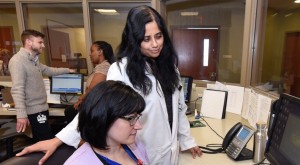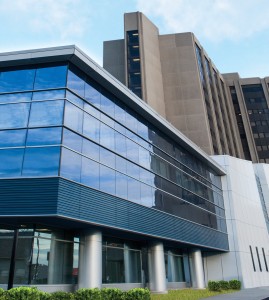by Alycia Ripley
According to the National Association of Mental Illness (NAMI), approximately one in every five adults experience mental illness in a given year. One in 25 adults and one in five youth aged 13-18 experiences a mental disorder. For children aged eight to 15, the estimate is 13%, and about 18% of adults experience an anxiety, post-traumatic stress, or obsessive-compulsive disorder.
Here in Buffalo, Erie County Medical Center (ECMC) remains at the forefront in mental health services through its Comprehensive Psychiatric Emergency Program (CPEP). Renovations have expanded its programs and services, and Dr. Michael Cummings, ECMC Executive Director of Behavioral Health and Director of Community Psychiatry at University of Buffalo, is a key player in these new advancements.
In January 2014, ECMC reopened CPEP as the region’s only 24-hour psychiatric emergency program. CPEP combines psychiatry, social work, nursing, and community support systems to achieve each patient’s highest level of mental health, while successfully reintegrating patients into their natural environments.
CPEP offers early and accurate patient assessments, affordable patient options, and important connections to community-based services such as schools and churches. This comprehensive outlook allows a patient’s progress to be followed closely from admission to outpatient care. Dr. Cummings states, “Our goal is to provide comprehensive and complete care, and prepare patients’ natural environments to aid in their support, whether that be families or community programs.”
Peer advocates are integral to the program. Many are former patients trained to serve as the voice and perspective of an assigned patient. Advocates help physicians better understand patients’ physical symptoms and frustrations. The goal is to create a formalized position for these advocates to serve as patient navigators who will identify inpatient and outpatient care needs, treatment, and ensure a personal connection with patients by following up on progress with calls and visits.
Crisis Intervention Teams enhance education and communication amongst therapists, advocacy groups, and law enforcement agencies. Law enforcement personnel attend classes to better understand trauma and mental health options. Education helps police identify key symptoms, minimize unnecessary arrests and identify the necessary course of action. Crisis Intervention Teams emphasize ‘following through’ on patients brought to CPEP. Instead of simply dropping them off, police stay informed on progress and case information.
CPEP patients are treated for bipolar disorders, psychotic episodes, depression, developmental disabilities, and substance abuse. A short-term stay unit exists as well as at-home evaluation and treatment, emergency housing, counseling and medication management follow-up, children’s inpatient services, crisis intervention, and a program connecting patients to community resources. Janell Rosati, Director of Special Projects with the UB Department of Psychiatry, adds, “It’s an exciting and creative time to be part of CPEP. We are devising new ideas to help increase the level of patient care, hospital efficiency, and mental health community partnerships.”
Any individual who feels they or a family member could benefit from CPEP can be brought directly to the program’s location at ECMC, 462 Grider Street, Buffalo, 14215, or call 716-898-3462 for more information. Learn more at www.ecmc.edu.
About the Author:
Alycia Ripley is a local freelance writer and an award-winning novelist. Learn more at www.alyciaripley.com.












